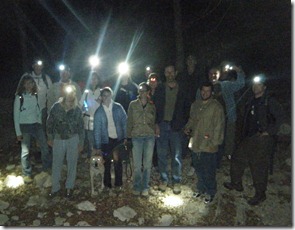But you must not imagine that the new men are, in the ordinary sense, all alike. A good deal of what I have been saying in this last book might make you suppose that that was bound to be so. To become new men means losing what we now call ‘ourselves’. Out of our selves, into Christ, we must go. His will is to become ours and we are to think His thoughts, to ‘have the mind of Christ’ as the Bible says. And if Christ is one, and if He is thus to be ‘in’ us all, shall we not be exactly the same? It certainly sounds like it; but in fact it is not so.
Out of our selves, into Christ, we must go. His will is to become ours and we are to think His thoughts, to ‘have the mind of Christ’ as the Bible says. And if Christ is one, and if He is thus to be ‘in’ us all, shall we not be exactly the same? It certainly sounds like it; but in fact it is not so.
It is difficult here to get a good illustration; because, of course, no other two things are related to each other just as the Creator is related to one of His creatures. But I will try two very imperfect illustrations which may give a hint of the truth. Imagine a lot of people who have always lived in the dark. You come and try to describe to them what light is like. You might tell them that if they come into the light that same light would fall on them all and they would all reflect it and thus become what we call visible. Is it not quite possible that they would imagine that, since they were all receiving the same light, and all reacting to it in the same way (i.e. all reflecting it), they would all look alike? Whereas you and I know that the light will in fact bring out, or show up, how different they are. Or again, suppose a person who knew nothing about salt. You give him a pinch to taste and he experiences a particular strong, sharp taste. You then tell him that in your country people use salt in all their cookery. Might he not reply ‘In that case I suppose all your dishes taste exactly the same: because the taste of that stuff you have just given me is so strong that it will kill the taste of everything else.’ But you and I know that the real effect of salt is exactly the opposite. So far from killing the taste of the egg and the tripe and the cabbage, it actually brings it out. They do not show their real taste till you have added the salt. (Of course, as I warned you, this is not really a very good illustration, because you can, after all, kill the other tastes by putting in too much salt, whereas you cannot kill the taste of a human personality by putting in too much Christ. I am doing the best I can.)
Or again, suppose a person who knew nothing about salt. You give him a pinch to taste and he experiences a particular strong, sharp taste. You then tell him that in your country people use salt in all their cookery. Might he not reply ‘In that case I suppose all your dishes taste exactly the same: because the taste of that stuff you have just given me is so strong that it will kill the taste of everything else.’ But you and I know that the real effect of salt is exactly the opposite. So far from killing the taste of the egg and the tripe and the cabbage, it actually brings it out. They do not show their real taste till you have added the salt. (Of course, as I warned you, this is not really a very good illustration, because you can, after all, kill the other tastes by putting in too much salt, whereas you cannot kill the taste of a human personality by putting in too much Christ. I am doing the best I can.)
It is something like that with Christ and us. The more we get what we now call ‘ourselves’ out of the way and let Him take us over, the more truly ourselves we become. There is so much of Him that millions and millions of ‘little Christs’, all different, will still be too few to express Him fully.
Quotes from Mere Christianity, Part 90
C.S. Lewis, Mere Christianity (1952; Harper Collins: 2001) 223-225.
 The statement that I do not ‘care much for’ the Sermon on the Mount but ‘prefer’ the ‘Pauline ethic’ of man’s sinfulness and helplessness carries a suggestion of alternatives between which we may choose, where I see successive stages through which we must proceed. Most of my books arc evangelistic, addressed to tous exo. It would have been inept to preach forgiveness and a Saviour to those who did not know they were in need of either. Hence St Paul’s and the Baptist’s diagnosis (would you call it exactly an ethic?) had to be pressed. Nor am I aware that our Lord revised it (‘if ye, being evil…‘). As to ‘caring for’ the Sermon on the Mount, if ‘caring for’ here means ‘liking’ or enjoying, I suppose no one ‘cares for’ it. Who can like being knocked flat on his face by a sledge-hammer? I can hardly imagine a more deadly spiritual condition than that of the man who can read that passage with tranquil pleasure. This is indeed to be ‘at ease in Zion’.
The statement that I do not ‘care much for’ the Sermon on the Mount but ‘prefer’ the ‘Pauline ethic’ of man’s sinfulness and helplessness carries a suggestion of alternatives between which we may choose, where I see successive stages through which we must proceed. Most of my books arc evangelistic, addressed to tous exo. It would have been inept to preach forgiveness and a Saviour to those who did not know they were in need of either. Hence St Paul’s and the Baptist’s diagnosis (would you call it exactly an ethic?) had to be pressed. Nor am I aware that our Lord revised it (‘if ye, being evil…‘). As to ‘caring for’ the Sermon on the Mount, if ‘caring for’ here means ‘liking’ or enjoying, I suppose no one ‘cares for’ it. Who can like being knocked flat on his face by a sledge-hammer? I can hardly imagine a more deadly spiritual condition than that of the man who can read that passage with tranquil pleasure. This is indeed to be ‘at ease in Zion’.












